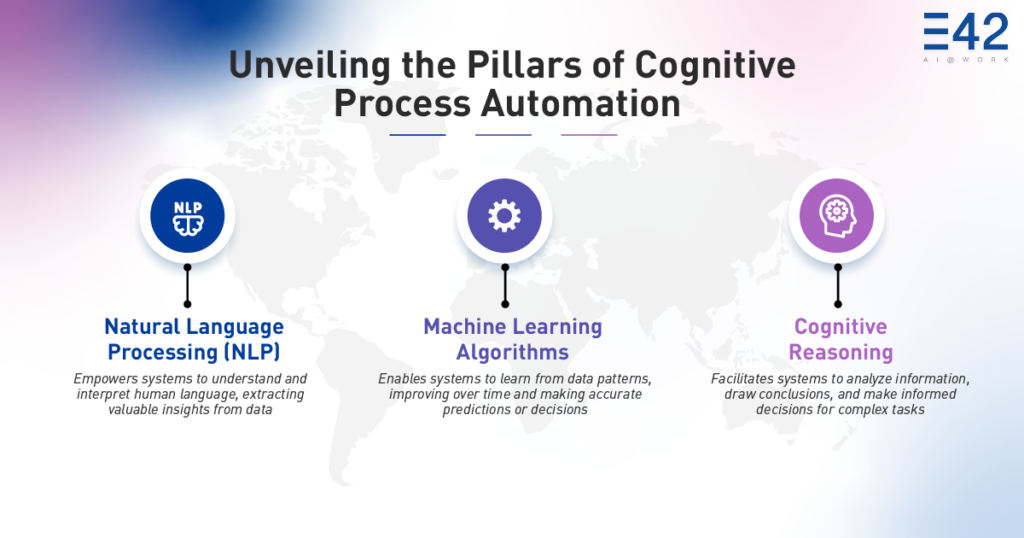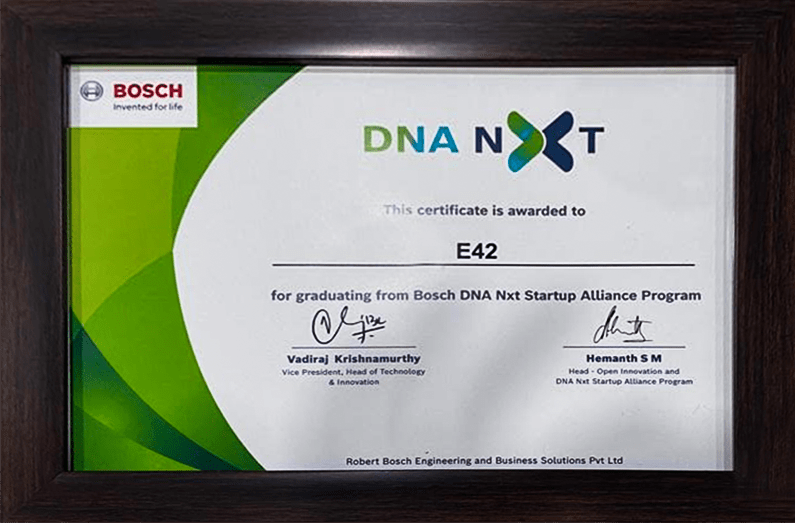Step into the realm of technological marvels, where the lines between humans and machines blur and innovation takes flight. Welcome to the world of AI-led Cognitive Process Automation (CPA), a groundbreaking concept that holds the key to unlocking unparalleled efficiency, accuracy, and cost savings for businesses. At the heart of this transformative technology lies the secret to empowering enterprises into navigating the future of automation with confidence and clarity. In this article, we embark on a journey to demystify CPA, peeling back the layers to reveal its fundamental principles, components, and the remarkable benefits it brings.
The Symphony of Cognitive Process Automation
Imagine a symphony playing before your very eyes—a symphony where artificial intelligence (AI), machine learning, and Natural Language Processing (NLP) dance harmoniously and come together as powerful AI assistants, bringing forth the magic of automation for enterprises, elevating the human workforce and helping them achieve more in lesser time. CPA orchestrates this magnificent performance, fusing AI technologies and bringing to life, virtual assistants, or AI co-workers, as we like to call them—that mimic the intricate workings of the human mind. CPA surpasses traditional automation approaches like robotic process automation (RPA) and takes us into a workspace where the ordinary transforms into the extraordinary.
You might be wondering, exactly what is cognitive automation? It goes beyond automating repetitive and rule-based tasks and handles complex tasks that require human-like understanding and decision-making. By leveraging NLP, machine learning algorithms, and cognitive reasoning, cognitive automation solutions offer a symphony of capabilities that revolutionize how businesses operate.
Unveiling the Pillars of Cognitive Process Automation

- Natural Language Processing (NLP): NLP allows systems to understand and interpret human language in a meaningful way. By leveraging techniques such as text analysis and sentiment analysis, cognitive automation systems can extract insights from vast amounts of unstructured data, including emails, documents, and social media interactions.
- Machine Learning Algorithms: Machine learning algorithms enable systems to learn from data patterns and make predictions or decisions based on that learning. Through continuous training and improvement, cognitive automation systems can adapt to new scenarios and optimize their performance over time.
- Cognitive Reasoning: Cognitive reasoning refers to the ability of systems to analyze and interpret information, draw conclusions, and make informed decisions. Cognitive automation leverages AI techniques that can process complex tasks that require higher-order thinking and problem-solving abilities.
Teaching Machines to Think and Act Like Humans
In the captivating realm of cognitive automation, machines (AI co-workers) rise above the confines of mundane tasks and venture into the realm of true intelligence. They possess the remarkable ability to process unstructured data, such as emails, documents, and social media interactions, extracting invaluable insights that were once hidden amidst a sea of information. AI co-workers can be built and deployed to tackle complex tasks that demand higher-order thinking and decision-making abilities.
By leveraging sophisticated techniques like NLP and cognitive process automation, these AI co-workers unravel the intricate threads of language, understanding the nuances, sentiments, and even the subtleties that lie between the lines— as a result, becoming astute problem solvers, effortlessly navigating through complex scenarios that require human-like comprehension and reasoning.
Cognitive automation unleashes high levels of efficiency and productivity. Mundane and time-consuming tasks that once burdened human workers are seamlessly automated, freeing up valuable resources to focus on strategic initiatives and creative endeavors. This not only enhances the overall speed and effectiveness of operations but also fuels innovation and drives organizational success.
Picture a world where customer interactions are elevated to a whole new level. With cognitive automation powering intuitive AI co-workers, businesses can engage with their customers in a more personalized and meaningful manner. These AI assistants possess the ability to understand and interpret customer queries, providing relevant and accurate responses. They can even analyze sentiment, ensuring that customer concerns are addressed with empathy and understanding. The result is enhanced customer satisfaction, loyalty, and ultimately, business growth.
The potential of intelligent AI assistants extends across various industries. In healthcare, these AI co-workers can revolutionize patient care by processing vast amounts of medical data, assisting in accurate diagnosis, and even predicting potential health risks. In finance, they can analyze complex market trends, facilitate intelligent investment decisions, and detect fraudulent activities with unparalleled accuracy. The applications are boundless, transforming the way businesses operate and unlocking untapped potential.
In essence, cognitive automation emerges as a game-changer in the realm of automation. It blends the power of advanced technologies to replicate human-like understanding, reasoning, and decision-making. By transcending the limitations of traditional automation, cognitive automation empowers businesses to achieve unparalleled levels of efficiency, productivity, and innovation.
An Overture of Benefits
- Increased Efficiency: As evident by now, AI co-workers leverage cognitive automation to automate repetitive and time-consuming tasks and subsequently free up human resources to focus on more strategic and creative activities. This leads to improved productivity and faster processing times, allowing organizations to accomplish more with fewer resources. A McKinsey study found that organizations using cognitive automation solutions could automate between 50 and 70 percent of the tasks.
- Improved Accuracy and Reduced Errors: Benefits of cognitive automation include minimizing the risk of human error by leveraging machine learning algorithms and cognitive reasoning capabilities. This leads to higher accuracy in decision-making and reduces costly mistakes, especially in areas that require complex data analysis or handling large volumes of information.
- Cost Savings: By streamlining processes and optimizing resource allocation, cognitive automation enables cost savings for organizations. It eliminates manual and paper-based workflows, reduces the need for human intervention, and optimizes resource utilization. The McKinsey study says that CPA helps enterprises reduce annual labor costs by 20 to 30% and results in a triple-digit ROI!
Challenges and Considerations
Implementing cognitive automation comes with its share of challenges and considerations. To overcome the challenges, businesses should prioritize the following best practices:
- Data Quality: Ensure the accuracy and reliability of data through data cleansing and validation processes
- Privacy and Security: Bring in tools that have robust security measures in place to safeguard sensitive information and comply with privacy regulations
- Change of Management: Manage organizational restructuring and address employee resistance through transparent communication and training
- Human-AI Collaboration: Foster collaboration between humans and AI systems, leveraging human context and ethical considerations alongside AI capabilities
Conclusion
In essence, cognitive automation emerges as a game-changer in the realm of automation. It blends the power of advanced technologies to replicate human-like understanding, reasoning, and decision-making. By transcending the limitations of traditional automation, cognitive automation empowers businesses to achieve unparalleled levels of efficiency, productivity, and innovation. By addressing challenges like data quality, privacy, change management, and promoting human-AI collaboration, businesses can harness the full benefits of cognitive process automation. Embracing this paradigm shift unlocks a new era of productivity and competitive advantage. Prepare for a future where machines and humans unite to achieve extraordinary results.
To know more about the intelligent AI co-workers built on E42 and to kickstart your enterprise automation journey, write to us at interact@e42.ai!



